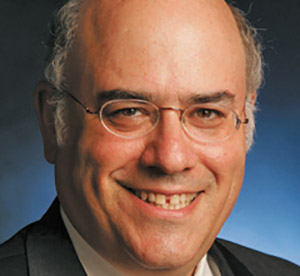
Teaneck—The audience listened with rapt attention as Rabbi Dr. Jacob J. “JJ” Schacter described incidents about his father’s experiences as the first Jewish chaplain to enter Buchenwald after its liberation 70 years ago. Rav Schacter spoke at Congregation Rinat Yisrael on the combined occasions of the 70th anniversary of the liberation of the Buchenwald Concentration Camp in Germany, and the second anniversary of the yahrzeit of his father, the late Rabbi Herschel Schacter z”l.
Rabbi Herschel Schacter joined the US Army as a chaplain, “in a desire to help Jews,” Schacter said. He was sent to many different posts in the US, the Caribbean, and Greenland and constantly requested to be sent to Europe. He arrived there in time to participate in the Battle of the Bulge and finally was able to commandeer a vehicle to take him to Buchenwald. He arrived several hours after its liberation. To the consternation of his army superiors, he moved into the camp and lived there for 10 weeks together with the survivors. He catered to their physical and psychological needs as much as possible. So many children were left as orphans, adults without spouses and family—a totally overwhelming experience.
It is well known that one of the first children that he came into contact with was the now well-known Rav Yisroel Meir Lau. He and the young Lau searched for the boy’s brother, who they eventually found in the hospital with typhoid. Fortunately they were able to be reunited. Rav Schacter felt the great urgency to help the victims of this atrocity by reuniting those whose families could be located as quickly and thoroughly as possible.
In one particular case, he contacted Rabbi Leo Jung in New York City because he needed assistance in the search for two young children who had been sent away by their mother in order to avoid being taken away by the Nazis. Immediately following the war, Rav Schacter befriended the father of these children and vowed to help him find them. Although it was deemed an impossible mission, eventually the children, who had been adopted by a family in Rochester, NY were reunited with their father and a new chapter in their lives together began.
This family, as is the case of many other survivors whom Rav Schacter assisted, are still extremely close with the Schacter family, and on the anniversary of the day of the liberation, there are those who still remember to call the Schacter household each year.
At the dedication of the Holocaust Museum in Washington, many survivors gathered as guests to take part in the momentous occasion. Rav Schacter was speaking to the group and told the story of a young boy who came to him shortly after the liberation and asked him point blank: “Where was God?” He hugged him and could say no more. Martin Greenfield, a successful, well-known men’s clothier in the audience, listened carefully and suddenly realized that he was the young boy about whom Rav Schacter was speaking. Following the presentation he embraced Rav Schacter, and introduced himself. They remained close friends following that encounter.
There are many more stories that can be related about Rav Schacter’s role in the aftermath of the atrocities, and much has been said about his bravery during this time. The miraculous redemption of so many, in many ways, manifested itself through the kindness, intelligence, and foresight of Rav Schacter.
Most moving to many was the way in which Rav J. J. Schacter spoke of his father. His love and honor of his life with a tsaddik as his father resounded in everything that he said. Those assembled found it an honorable experience to be able to attend the presentation.
By Nina Glick













